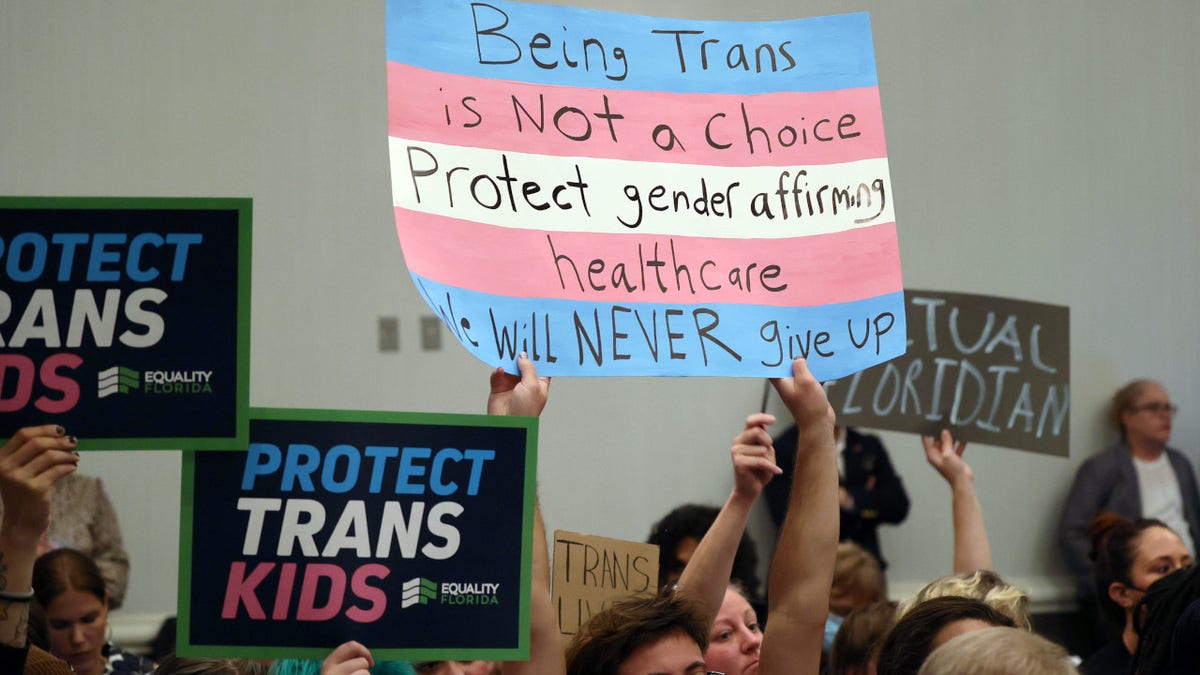Oklahoma Gov. Kevin Stitt says he won’t allow minors to undergo 'life-changing' gender surgeries in his state
Gov. Kevin Stitt signed a bill defunding gender transition medical services for individuals under 18-years-old at Oklahoma Children's Hospital at OU Health.
Republicans in Georgia have advanced a bill that would ban some surgical procedures for transgender minors, citing an obligation to protect children from "unnecessary and irreversible medical treatment."
The state House of Representatives on Thursday passed Senate Bill 140, which would prohibit hospitals and doctors from performing sex reassignment surgeries on minors or prescribing them hormone replacement therapies to treat gender dysphoria. The vote was 96-75 along party lines.
The bill contains limited exceptions for conditions other than gender dysphoria, such as treatment for sex disorders, including "ambiguous genitalia or chromosomal abnormalities," and has a grandfather clause for minors who began gender-transition care before July 1, 2023, and are "being treated with irreversible hormone replacement therapies."
Physicians who violate the proposed law would face disciplinary action from the state medical board and could lose their license to practice medicine.
YOUTH TRANS CLINICS PROVIDING ‘GENDER-AFFIRMING’ CARE TARGETE BY NEW HAWLEY BILL

Georgia lawmakers are considering a bill that would ban so-called "gender-affirming" care for transgender minors. (Ricardo Ramirez Buxeda/Orlando Sentinel/Tribune News Service via Getty Images)
"As legislators we are charged with protecting our most vulnerable population in the state," said Republican state Rep. Josh Bonner, the bill’s House sponsor. "Senate Bill 140 does just that by establishing guardrails to ensure that children struggling with identity issues are not rushed into decisions that would alter their bodies forever."
"Without question, those who struggle with issues of identity, including gender dysphoria, deserve our compassion and our care. No one denies this," Bonner said. "As a state we have made significant investments in mental health care, and I pray we continue to support any effort to deliver the appropriate care to those whose judgment isn't fully formed."

Georgia lawmakers met at the state Capitol on Thursday to debate legislation that would ban transgender surgeries and hormone therapies for minors. (Joe Sohm/Visions of America/Universal Images Group via Getty Images)
Democrats spoke out against the legislation. State Rep. Ruwa Romman warned of "unintended consequences" of preventing parents of transgender children from seeking the care that is recommended by the American Academy of Pediatrics and other medical professionals.
"Their parents know them better than any of us can and will. And it does not make sense that for those of us that have never spoken to those kids, that have never sat down with those kids, that have never heard those kids, make laws about those kids," she argued.
POPE FRANCIS: ‘GENDER IDEOLOGY’ IS ONE OF ‘MOST DANGEROUS IDEOLOGICAL COLONIZATIONS’

Transgender issues have become a cultural flashpoint as lawmakers, medical professionals and parents disagree over what is best for gender dysphoric youths. (Getty Images)
State Rep. Scott Holcomb, a Democrat from Atlanta, acknowledged that Republicans supporting the legislation believe they are upholding the principle of "do no harm." "We think this bill will in fact do real harm to some of our most vulnerable citizens," he countered, saying transgender people have become a "political punching bag."
But Republicans insisted the legislation is needed to prevent children from making permanent, life-altering decisions and said it will not stop grown adults from expressing themselves or seeking transgender care.
CLICK HERE TO GET THE FOX NEWS APP
"We must draw a line for the long-term of children," said Republican state Rep. Will Wade. "I believe that childhood is about giving young people time to develop and letting them learn by trial and error, but still protecting them from long-term harms."
The bill, which was amended by the House in committee, will now proceed to the Georgia Senate.












































